Great content isn’t just about writing; it’s about using smart tools that help you plan, create, and grow. But most content tools can be expensive, right? Not always.
There are amazing free and freemium tools that make content marketing easier, even if you’re just getting started.
Whether you’re writing blog posts, making social media graphics, or checking what your audience is searching for, these tools can save you time and help you do better work.
In this guide, you’ll find the best tools you can start using right away, without spending a lot of money. Let’s explore what’s possible for free!
Here are the popular content marketing tools of 2025
1. Semrush (freemium)
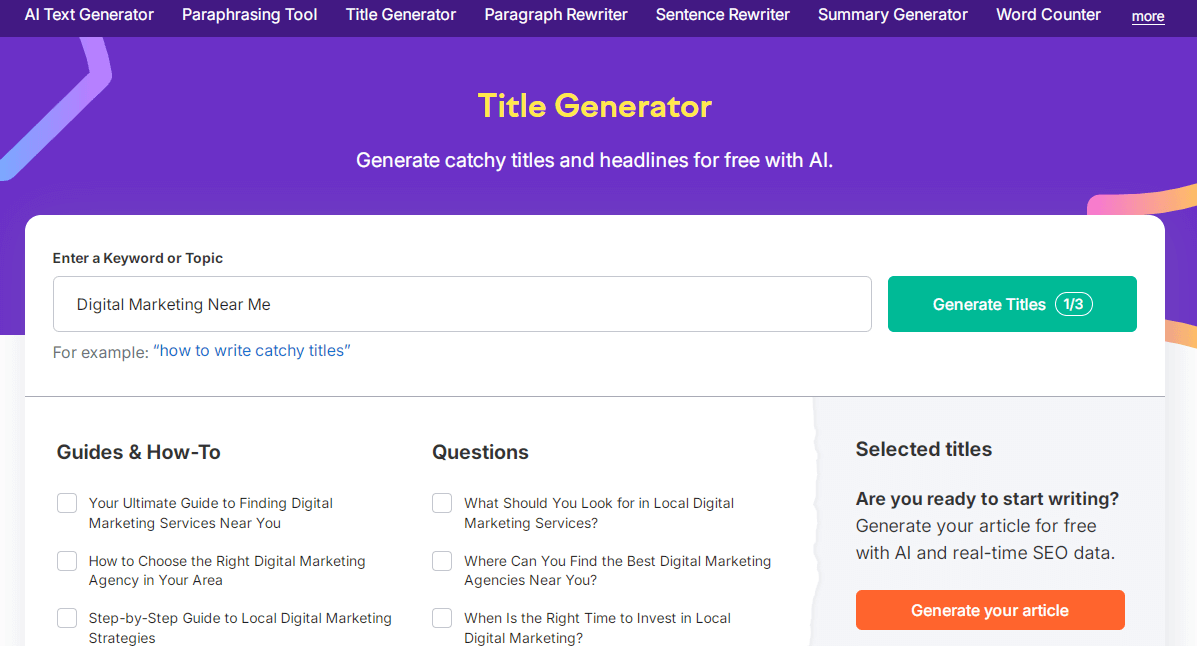
What it does: Semrush helps content marketers find the best keywords, analyze what competitors are doing, and write content that ranks high on Google. It brings together tools for SEO, writing, traffic analysis, and content planning, all in one platform, to help you grow your website traffic faster.
Key features:
- Keyword Magic Tool: Discover up to 20 million keyword ideas from a database of 26.6 billion keywords. Perfect for blog planning and topic research.
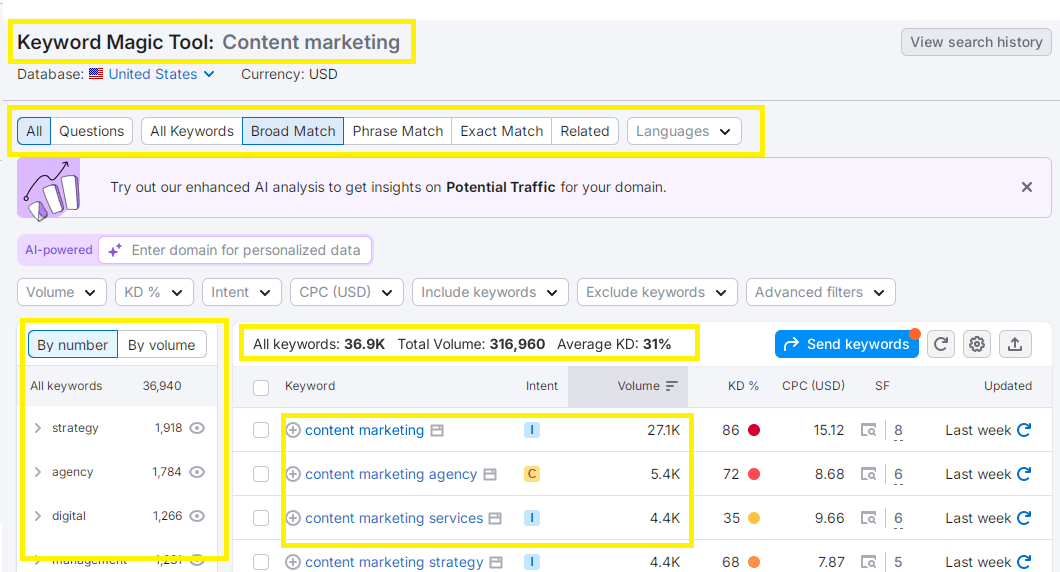
- Topic Research Tool: Get trending content ideas based on what’s working in your niche. Save time brainstorming by seeing what’s already popular.
- SEO Writing Assistant: Check SEO score, readability, tone, and originality as you write. It helps you create content that both readers and Google love.
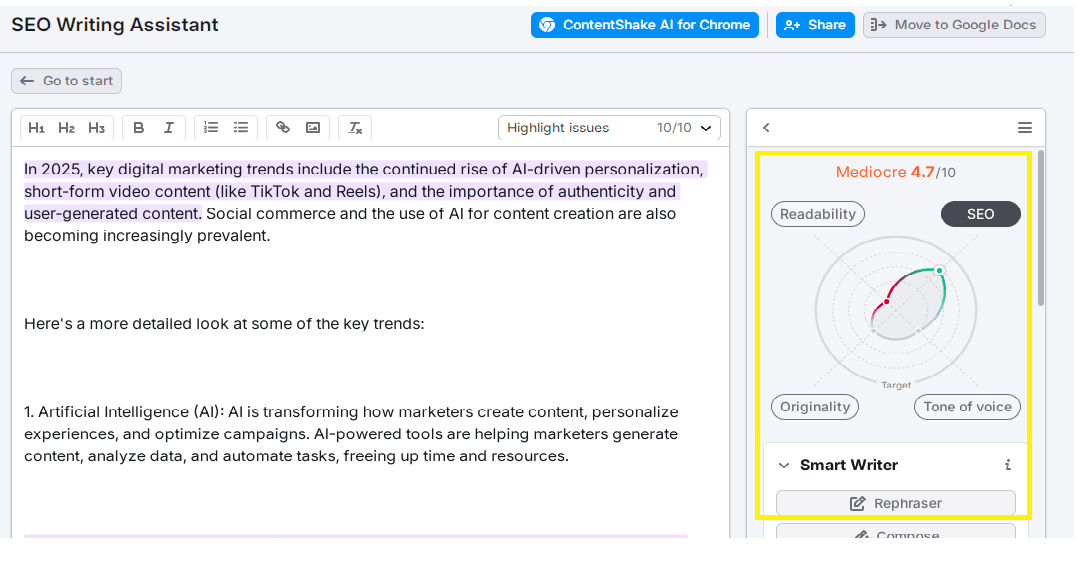
- Content Audit Tool: Analyze your website content to find pages that need updating or optimization. Improve old posts and boost their rankings.
- SERP Gap Analyzer: Spot keywords your competitors rank for but you don’t. Use AI to fill those content gaps quickly.
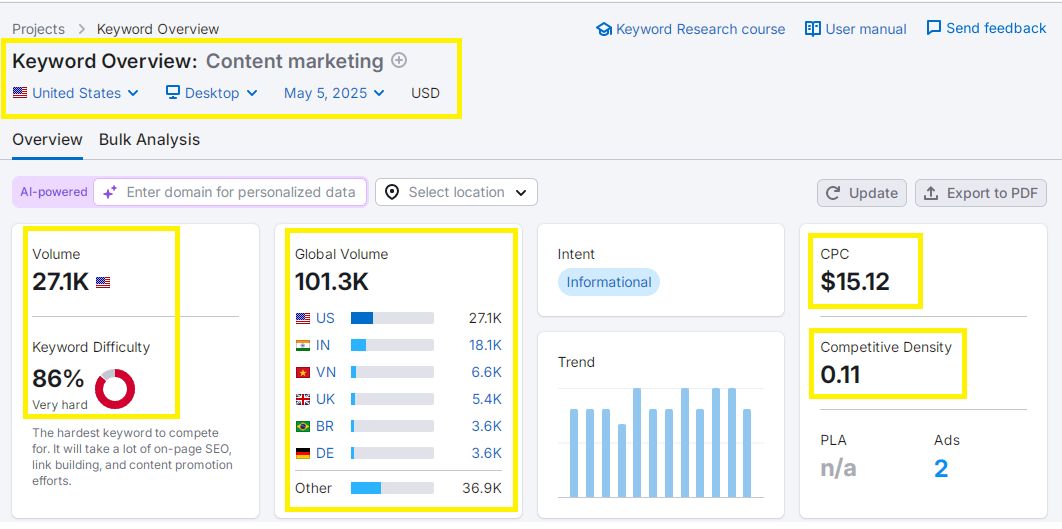
- Brand Monitoring: Track where your brand, blog, or keywords are mentioned online. Helps you find PR opportunities and build backlinks.
Use case for SEOs and content marketers:
- Find keywords with real traffic potential – Use the Keyword Magic Tool to build strong SEO content strategies.
- Get blog topic ideas fast – Save hours on research with the Topic Research tool.
- Write SEO-friendly content – Use the SEO Writing Assistant to improve your drafts in real time.
- Track how your content performs – Monitor rankings, traffic, and engagement using analytics tools.
- Outrank your competitors – Discover their winning keywords and replicate their success.
- Improve underperforming pages – Run content audits to refresh and republish old articles.
Pricing and plan: Semrush offers three paid plans based on your team size and needs. All plans include SEO, content, and marketing analysis tools. You can cancel or upgrade anytime.
- Pro Plan – $139.95/month
- Guru Plan – $249.95/month
- Business Plan – $499.95/month
Website: https://www.semrush.com/free-tools/
2. Ahrefs webmaster tool
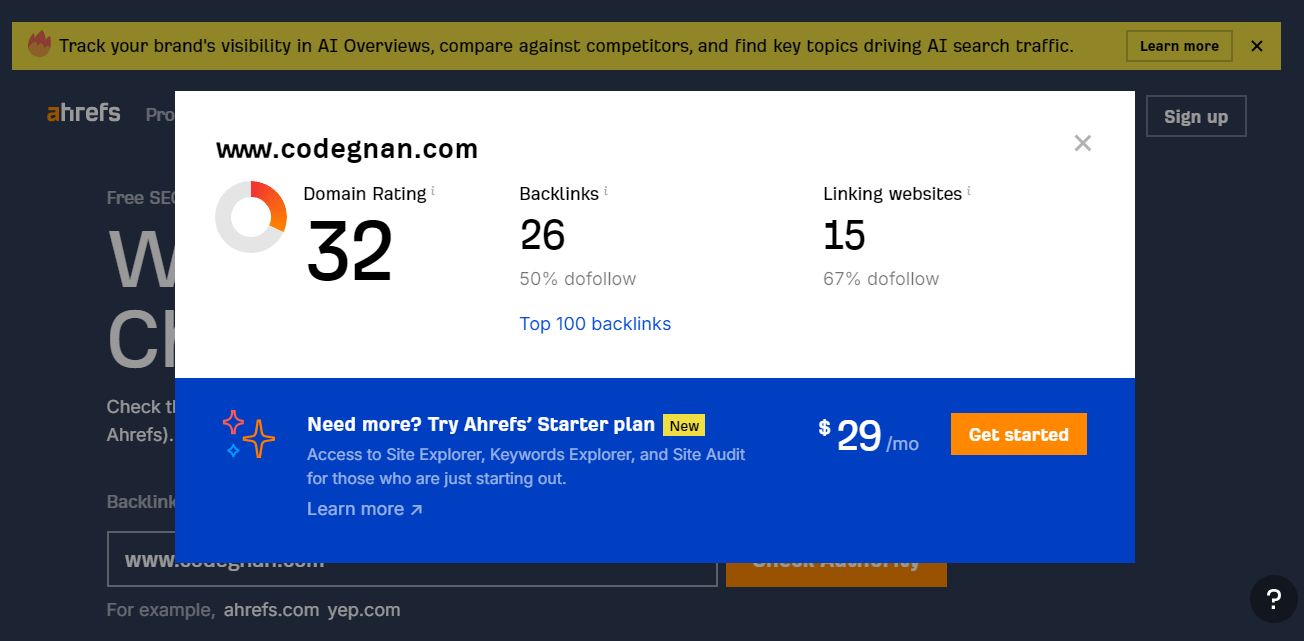
What it does: Ahrefs is an all-in-one SEO toolset that helps you grow your website traffic, find content ideas, analyze competitors, and track rankings. It gives you powerful data to plan better content and improve your visibility in search results.
Key features
- AI Writing tools: Find top-performing content across the web for any topic. See what headlines, formats, and domains are generating traffic and backlinks.
- Keyword Generator: Discover high-potential content topics with keyword ideas based on traffic, difficulty, and search intent. Helps you target what people are actually searching for.
Besides Google, this tool can help you generate keywords for Bing, YouTube, and Amazon.
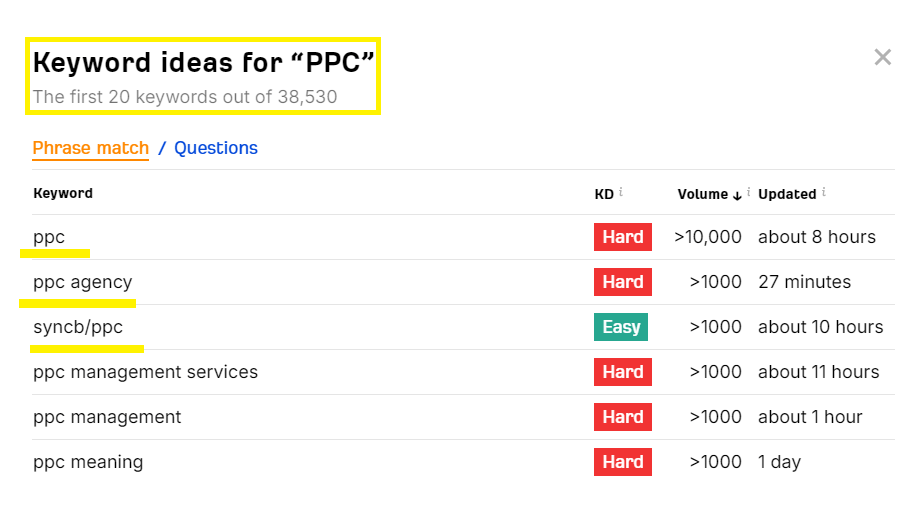
- Top Pages Report (in Site Explorer): See which pages bring the most traffic to any domain. Great for finding content ideas that already work in your niche.
- Content Gap Tool: Uncover keywords your competitors rank for, but you don’t. Use this to spot missing topics and expand your content strategy.
- Backlink Checker: Analyze which content gets the most backlinks so you can reverse-engineer link-worthy formats and topics.
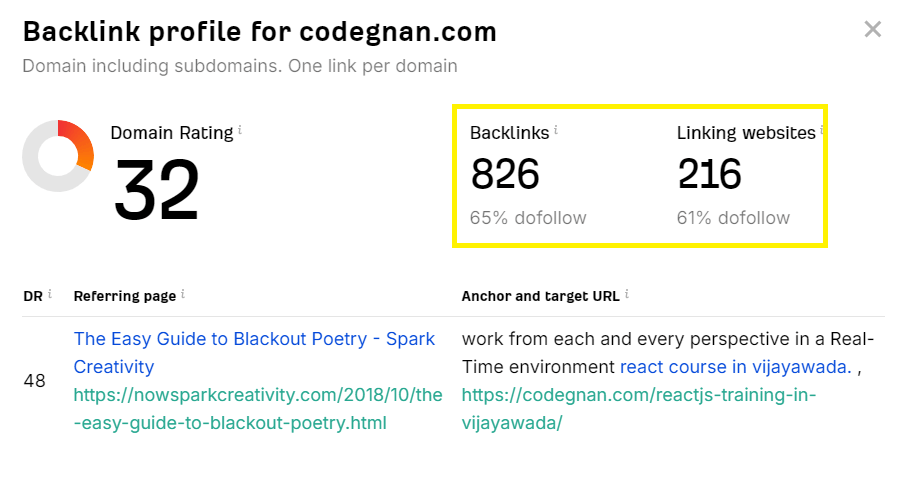
- Traffic Value Estimator: Use this tool to measure the organic traffic your content is worth based on its keyword rankings and CPC value.
- AI Writing Tools (Add-on): Get AI-powered content suggestions, grading, and inventory tools to refine and optimise your articles.
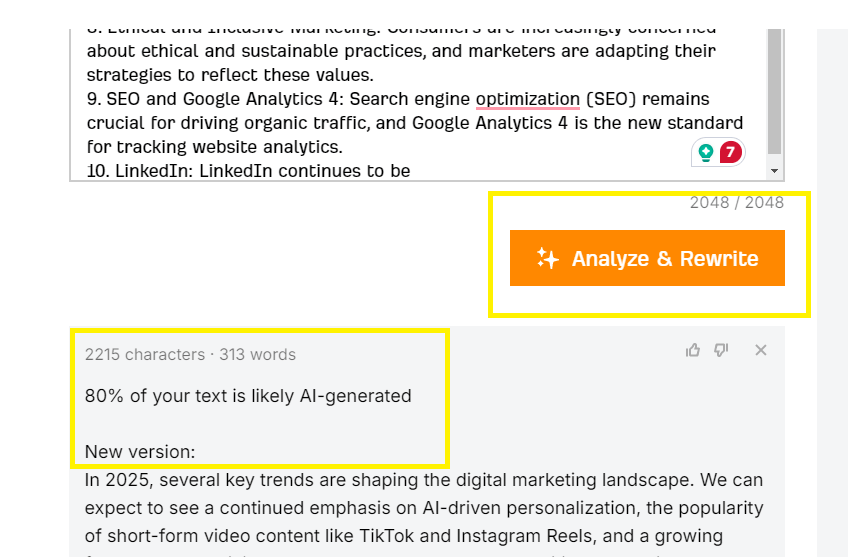
Use case for SEOs and content marketers:
- Find content gaps to write better blogs than your competitors.
- Track keyword rankings to measure SEO performance.
- Analyze backlinks to discover linking opportunities and build authority.
- Fix SEO issues before they impact your rankings.
- Discover trending content to write about what your audience cares about.
Pricing and plan:
- Starter – $29/month
- Lite – $129/month
- Standard – $249/month
- Advanced – $449/month
- Enterprise – $1,499/month
- Webmaster Tools – Free
Website: https://ahrefs.com/
3. SERP Similarity tool by SEO Growth Notes
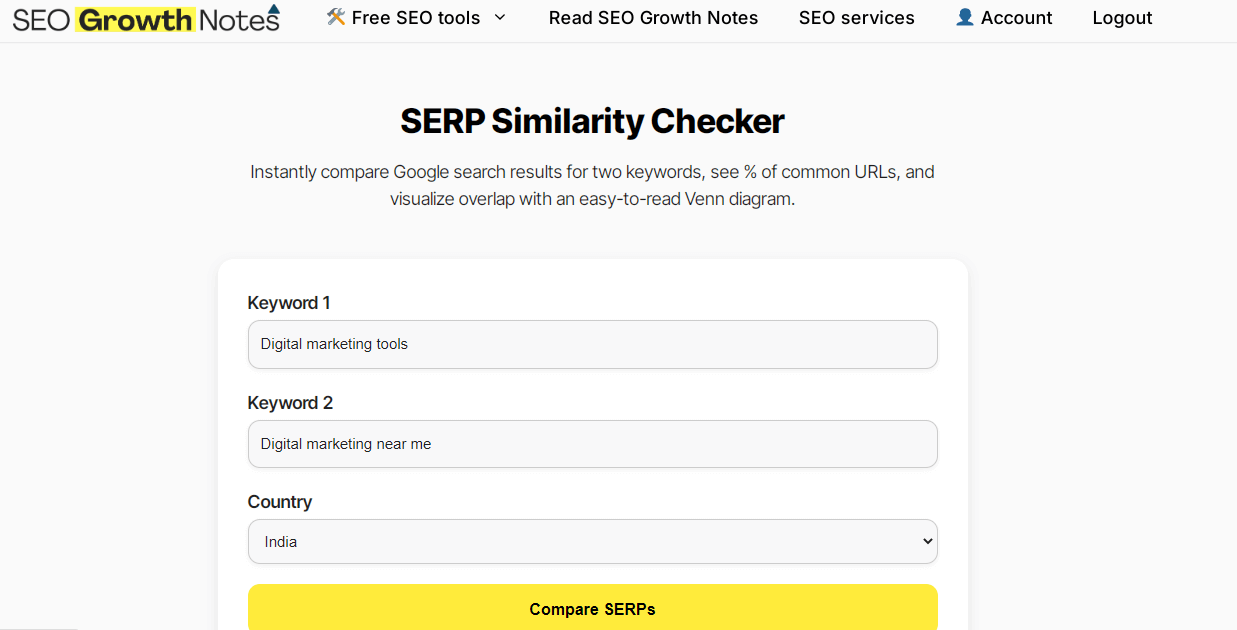
What it does: The SERP checker for multiple keywords by SEO Growth Notes helps content marketers and SEOs compare Google search results for up to 3 keywords. It shows how many pages rank across those keywords, helping you decide whether to combine or separate them into different content pieces.
Key features:
- Compare up to 3 keywords: Enter 2 or 3 keywords to see how their Google rankings overlap.
- Visual Venn diagram: Instantly see how many URLs are shared across keywords with a clear visual.
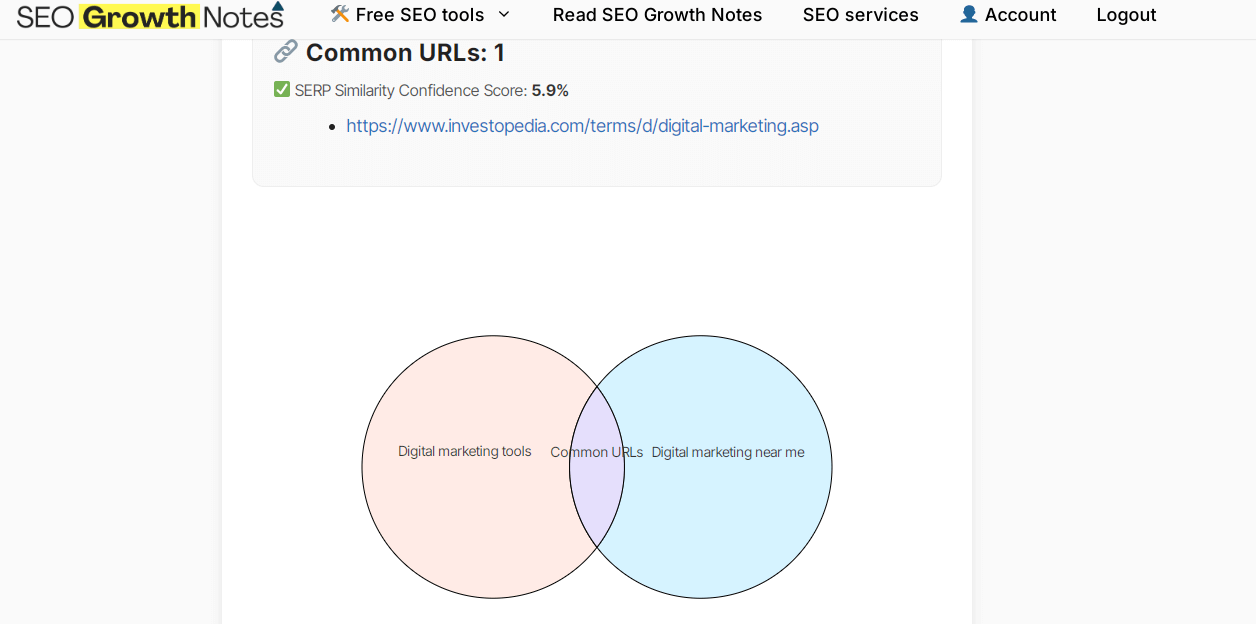
- Real-time, location-based data: The tool pulls fresh SERPs based on the country you select, with no outdated results.
- Side-by-side comparison: Get a clear table that lists the top URLs for each keyword and highlights common ones.
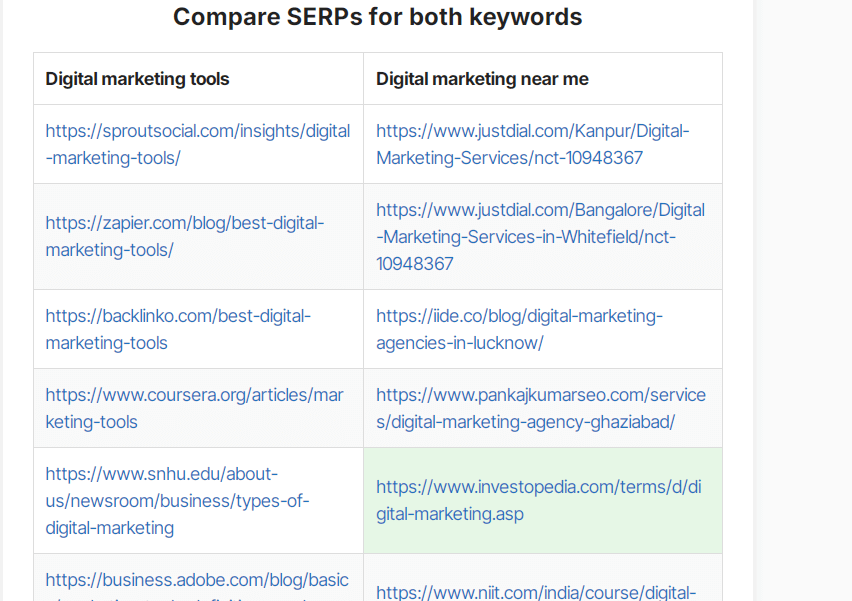
- Similarity confidence score: Understand how closely related keywords are, using an easy-to-read percentage scale.
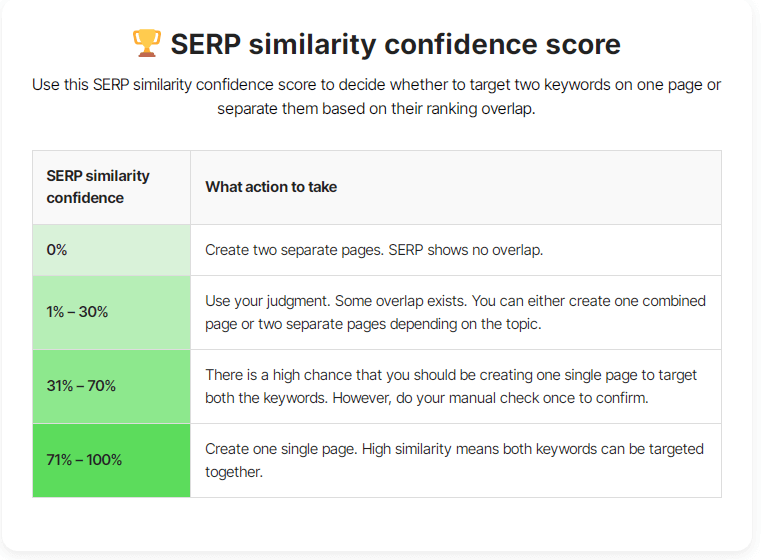
- Downloadable CSV reports: Save the keyword comparisons and shared URL data for audits or team sharing.
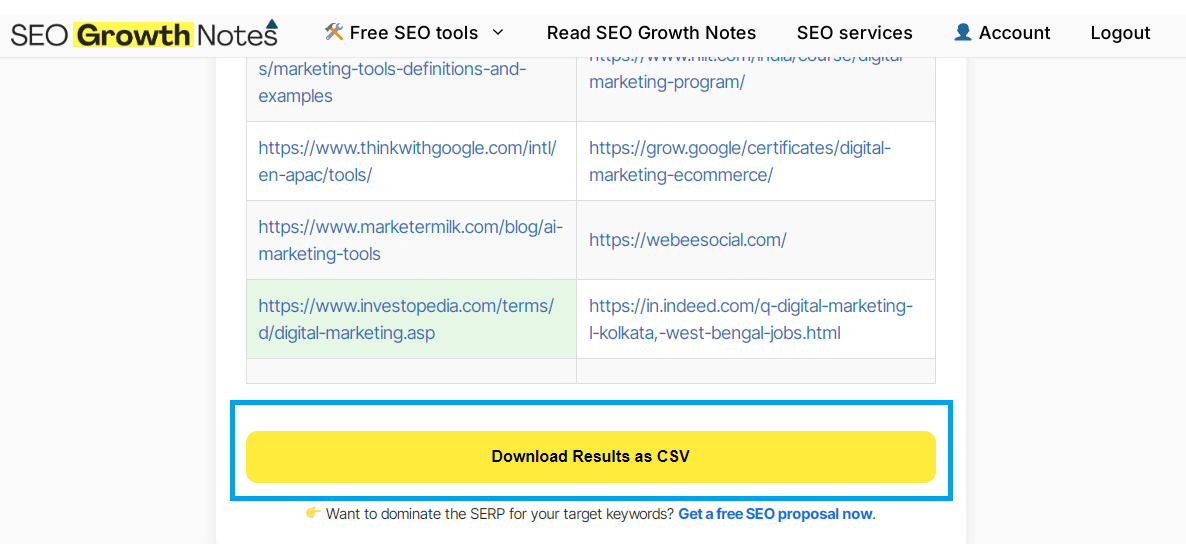
Use case for SEOs and content marketers:
- Cluster related keywords: Know which keywords to group on one page to rank better.
- Avoid keyword cannibalization: Don’t let your pages compete for the same keyword—use this to avoid overlap.
- Plan content smarter: Check before you write if one article can cover multiple topics.
- Validate new topic ideas: Confirm if two keywords are similar or different enough to need separate pages.
- Audit existing content: Re-check old blogs to see if any should be merged based on SERP similarity.
Pricing and plan: After signing up, the SERP Similarity Tool is 100% free and offers unlimited searches, with no credit card required.
👉 Check SERP overlap for free: https://seogrowthnotes.com/serp-similarity-checker/
We used to waste hours debating whether to target two keywords on the same page. After using the SERP Similarity Tool, our content strategy became sharper and more confident—and we started ranking faster.
— Rases Changoiwala, Founder of TapWell
4. Canva
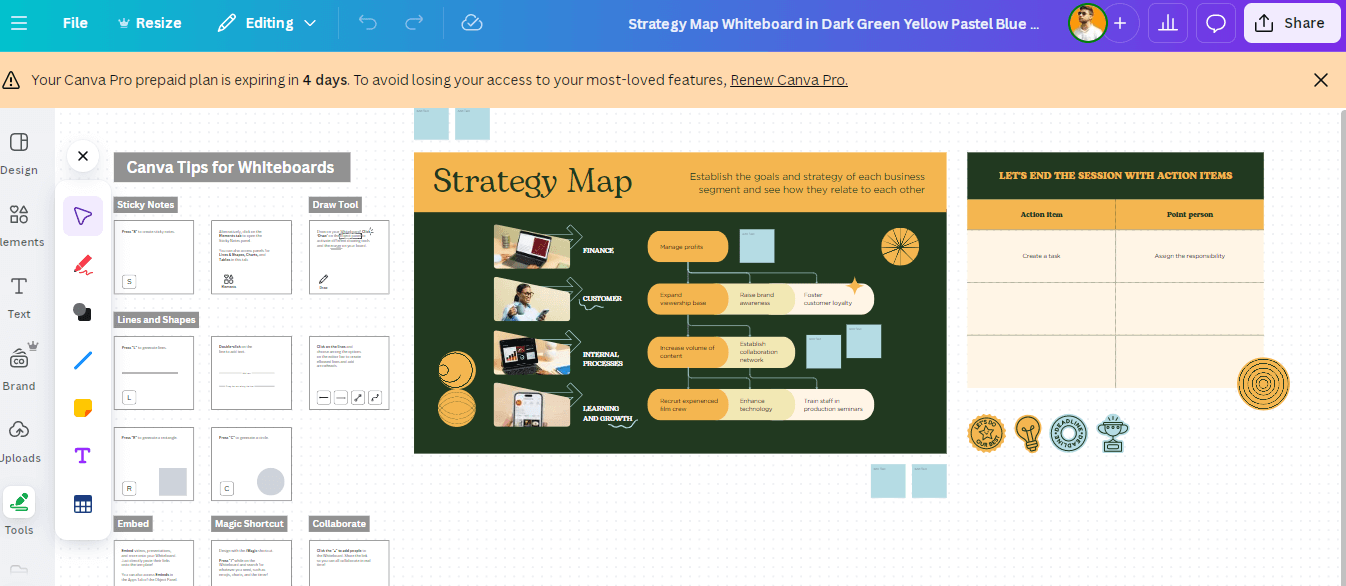
What it does: Canva is a drag-and-drop design tool that helps content marketers create stunning visuals like social media posts, blog graphics, infographics, and presentations, without needing graphic design skills. It saves time and makes your content look professional.
Key features:
- Thousands of Ready-Made Templates: Access templates for social posts, presentations, posters, resumes, and more—ready to customize in minutes.
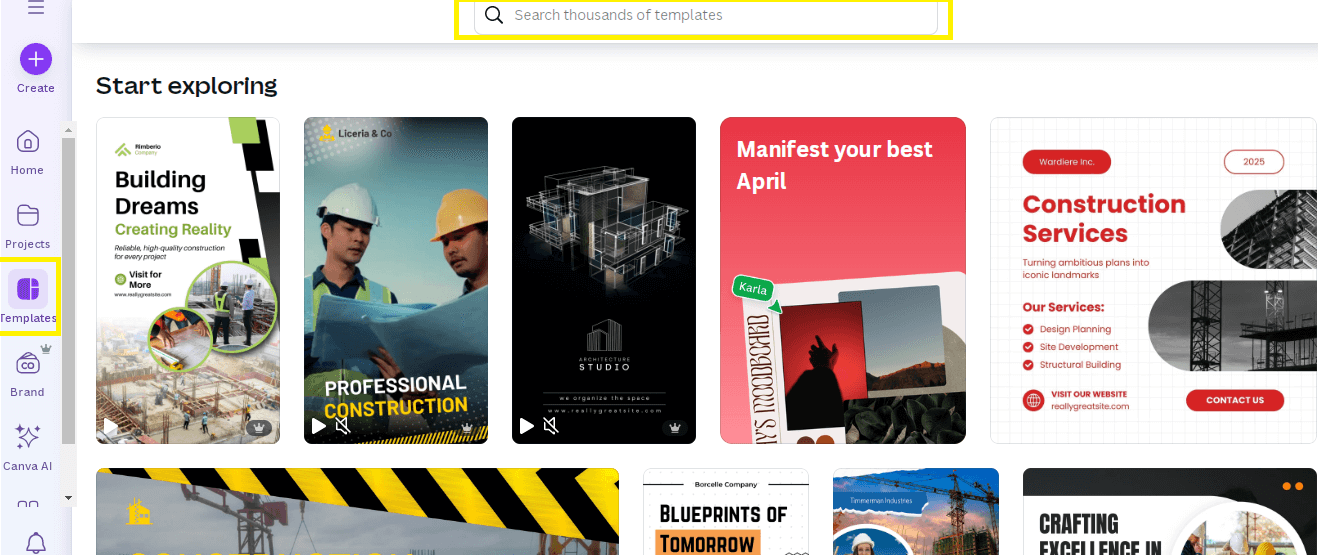
- Magic Write (AI Tool): Generate headlines, captions, and copy with Canva’s built-in AI writing assistant.
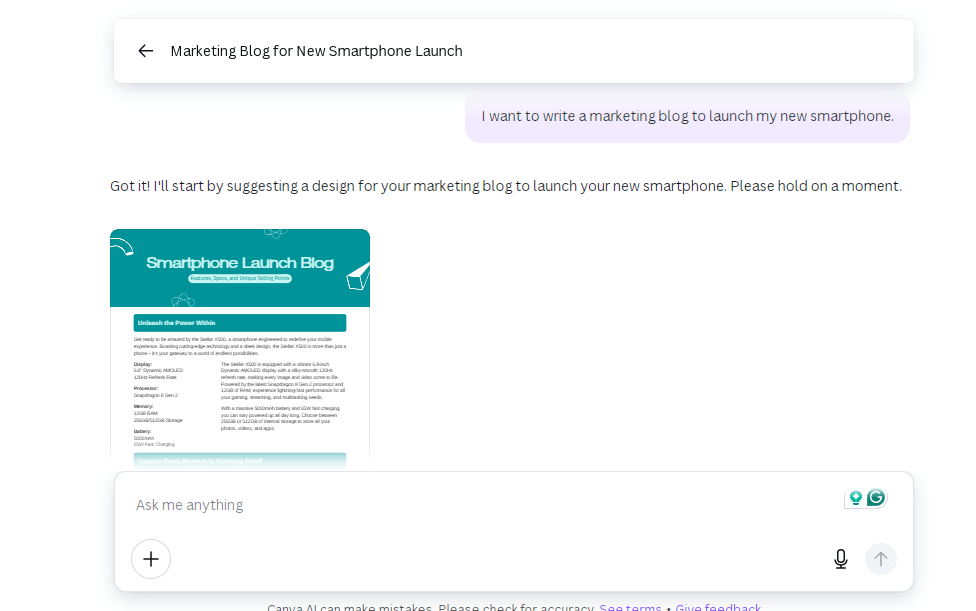
- Drag-and-Drop Editor: Quickly build beautiful designs by moving images, text, and elements around freely.
- Brand Kit (Limited in Free Plan): Upload your logo and use brand colors to keep content consistent (full kit in Pro).
- Collaborative Design: Share your design and get real-time feedback or edits from team members.
- Free Stock Photos & Icons: Choose from a wide library of free visuals to enhance your content.
Use case for SEOs and content marketers:
- Design blog banners to improve visual appeal and click-through rates.
- Create social media graphics that align with campaign goals.
- Develop engaging infographics to break down complex topics.
- Build presentations and decks for pitches or content strategy reviews.
- Generate post ideas and captions quickly using Magic Write AI.
Pricing and plan: Canva’s free plan includes thousands of templates, photos, and design elements at no cost. Paid Pro plan starts at ₹500/month.
Website: https://www.canva.com/
5. ChatGPT
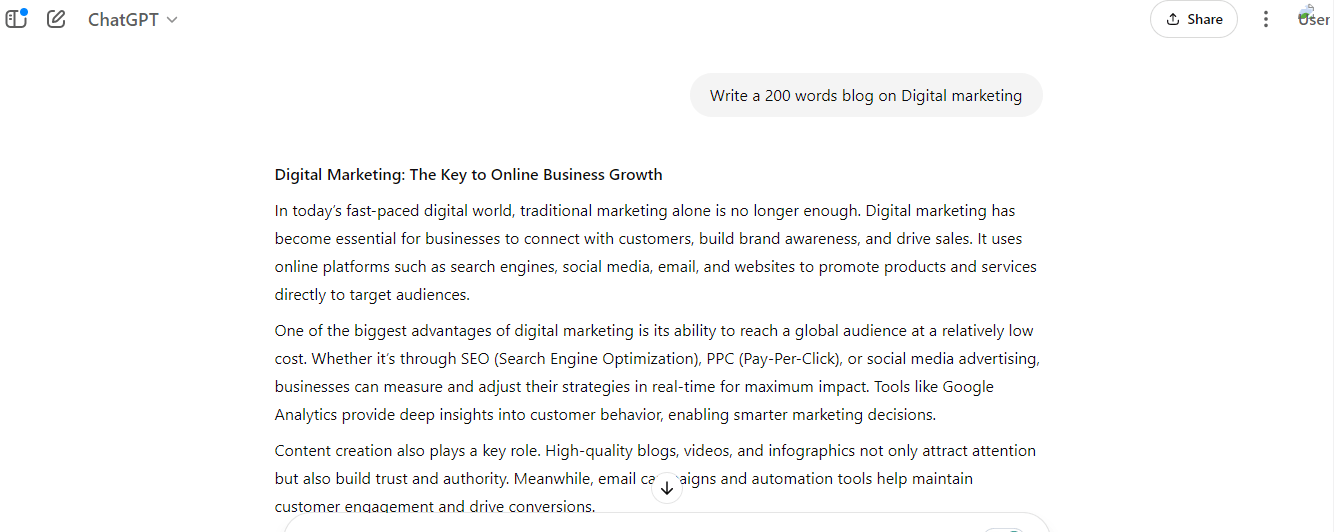
What it does: ChatGPT helps SEO professionals and content marketers plan, optimize, and scale their content strategies. From keyword mapping and SERP analysis to competitor breakdowns and metadata generation, it streamlines tedious SEO tasks so teams can focus on strategy and creativity.
Key features:
- SEO Prompting for Meta and Schema: Generate SEO titles, meta descriptions, FAQs, and even JSON-LD schema with simple prompts.
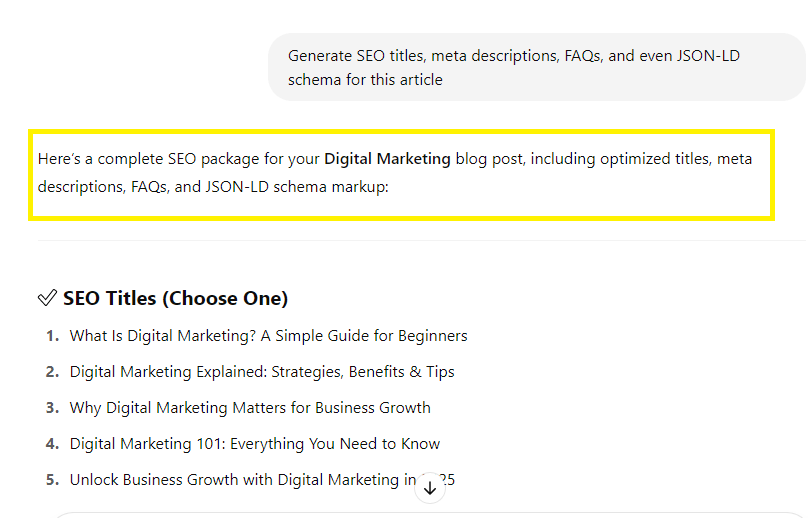
- SERP Simulation & Competitor Comparison: Ask ChatGPT to simulate the top 10 search results or compare content gaps with competitors.
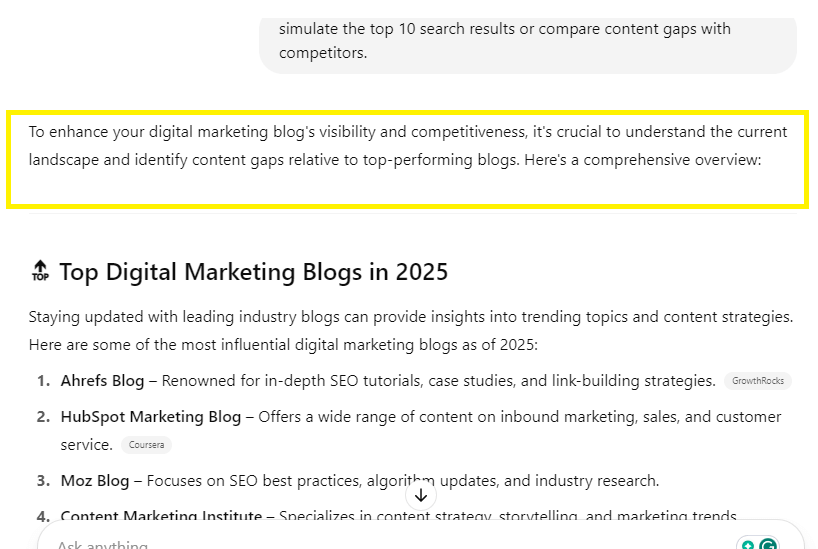
- Keyword Clustering & Topic Modeling: Turn keyword lists into organized content plans, clustered by search intent or funnel stage.
- Custom GPTs for SEO Workflows: Build dedicated GPTs trained to audit pages, recommend internal linking, or suggest NLP terms.
- Data Analysis with File Uploads: Upload keyword lists, content calendars, or GA reports, and ChatGPT helps extract insights, trends, or fix duplicates.
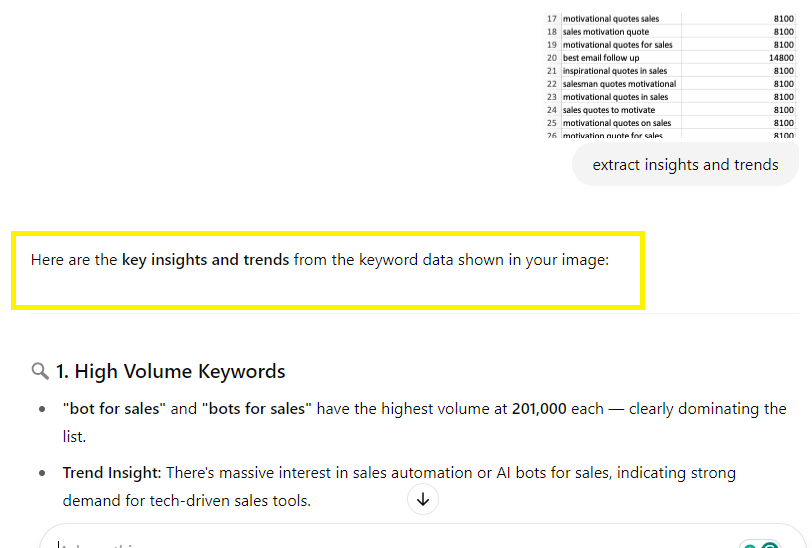
- Search + Chat Combined: With web browsing enabled (in GPT-4o), research is current, perfect for live SERP audits or content freshness checks.
Use case for SEOs and content marketers:
- Generate meta tags and alt text at scale with brand-specific tone.
- Create content briefs from keyword clusters based on SERP intent.
- Find internal linking opportunities using site structure or page themes.
- Replicate competitor content structures to outperform top-ranking blogs.
- Speed up content audits by summarizing missing tags, outdated sections, or readability gaps.
- Craft SEO-focused outlines that match what’s ranking now, not six months ago.
Pricing and plan:
- Free Plan: $0/month
- Plus: $20/month
- Pro: $200/month
- Team: $25/user/month (annual)
- Enterprise: Custom pricing
Website: https://chatgpt.com/
6. Hunter
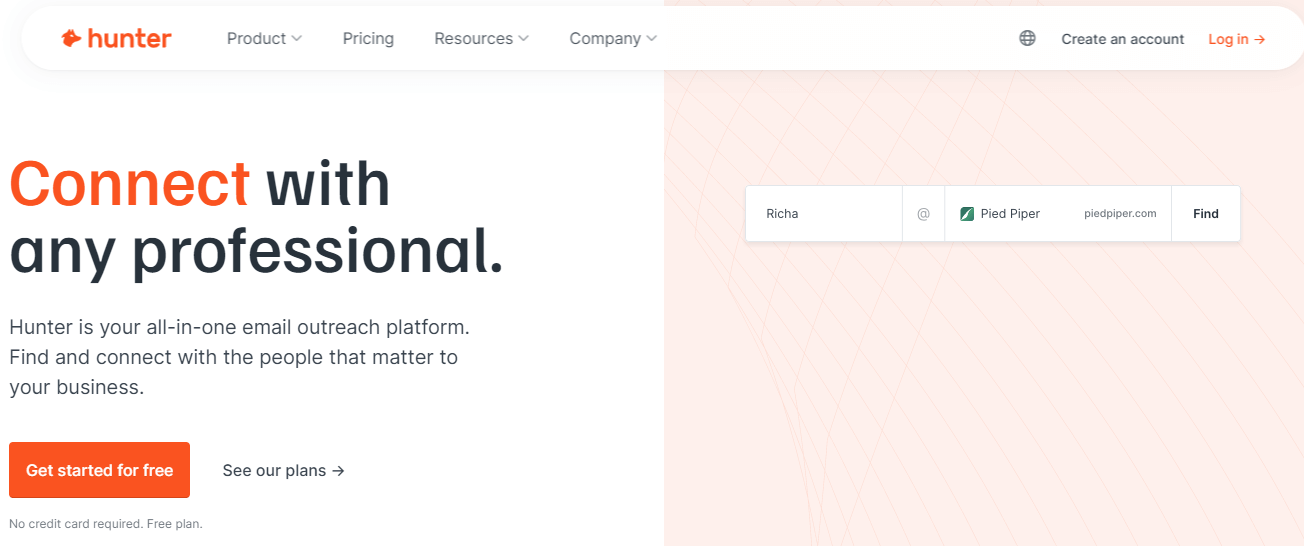
What it does: Hunter helps content marketers and SEOs find verified email addresses and connect with the right people for outreach, backlink building, and content promotion. It makes it easy to discover contact details, send cold emails, and track campaign results, all in one place.
Key features:
- Email Finder: Enter a domain or person’s name to find verified professional emails instantly for outreach.
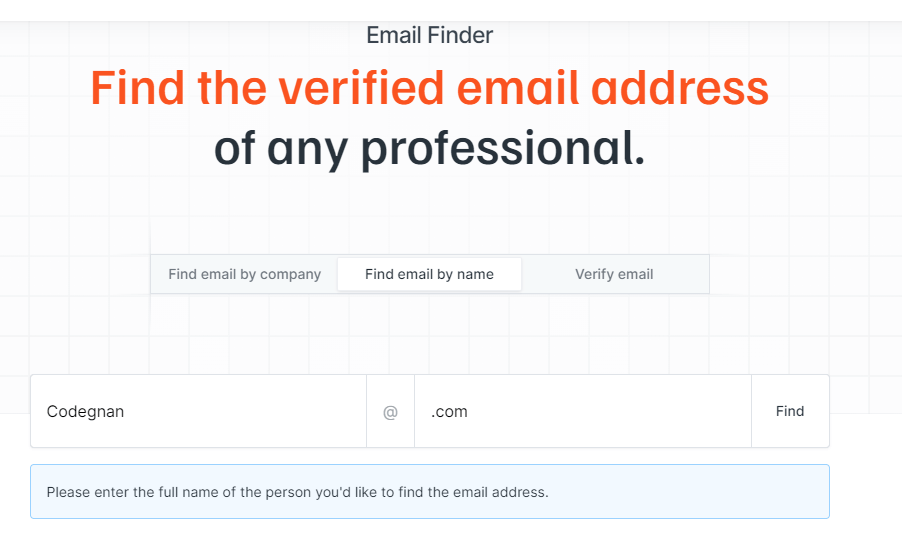
- Domain Search: This tool allows you to see all email addresses linked to a company’s domain. It is great for identifying editors or marketing contacts.
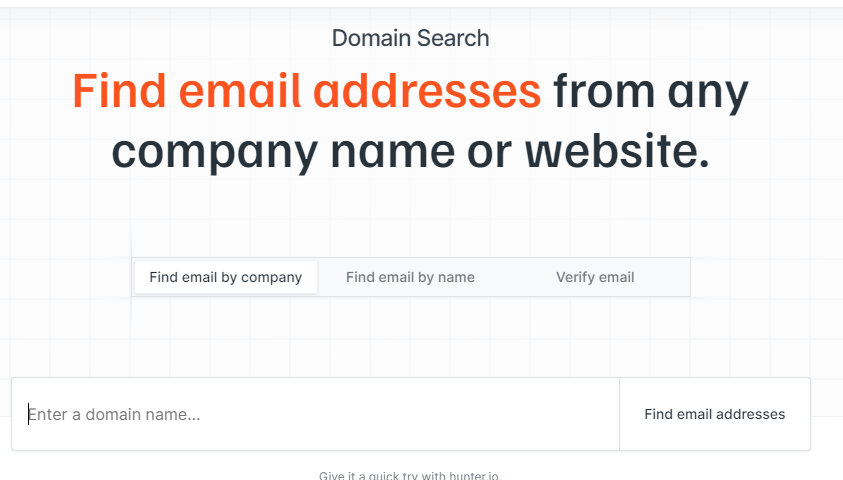
- Email Verifier: Check if an email is real and safe to use. This reduces bounce rates and protects your sender reputation.
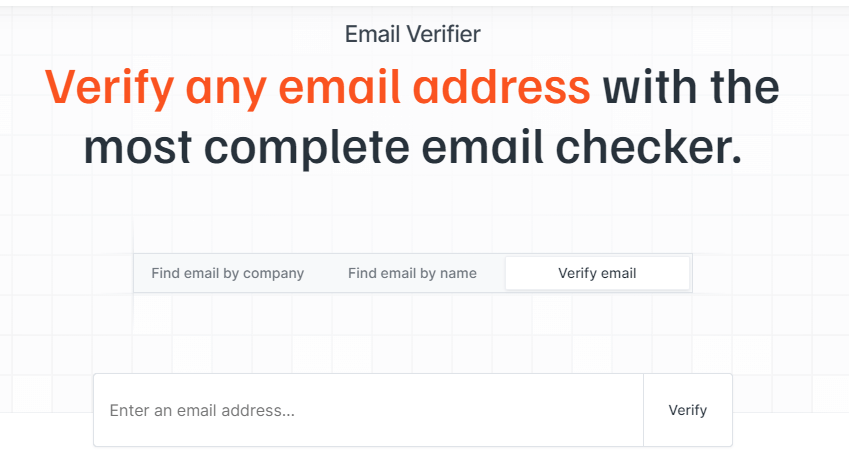
- Campaigns Tool: Send cold email campaigns with follow-ups directly from Hunter. No third-party tools needed.
- Chrome Extension: Find emails on LinkedIn or websites without leaving the page. Super handy during research.
Use case for SEOs and content marketers:
- Find outreach contacts to pitch guest posts or request backlinks.
- Build media lists of journalists, editors, or influencers for content promotion.
- Verify email addresses before running campaigns to avoid bounce issues.
- Send personalized outreach emails for link building directly from Hunter.
- Reach decision-makers for partnership or content collaboration opportunities.
Pricing and plan: Hunter offers a Free plan with 25 searches/month. Paid plans start at $49/month for 500 searches and 1,000 verifications.
Website: https://hunter.io/
7. Audience research assistance by SEO Growth Notes
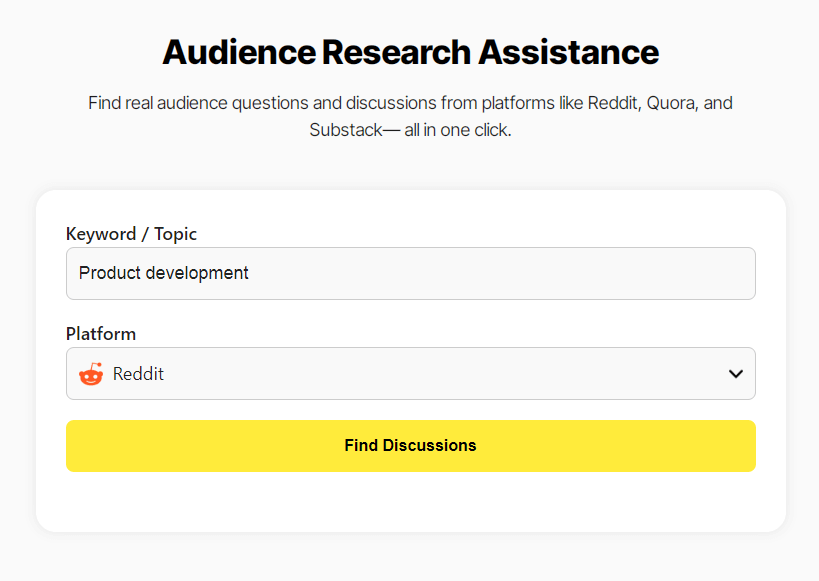
What it does: This tool helps you find real questions, frustrations, and discussions your audience already has on platforms like Reddit, Quora, and Substack. It shows you what people care about, so you can create content that actually connects and ranks.
Key features:
- One-Click Topic Search: Enter a keyword and instantly see real-time discussions from trusted user-generated platforms.
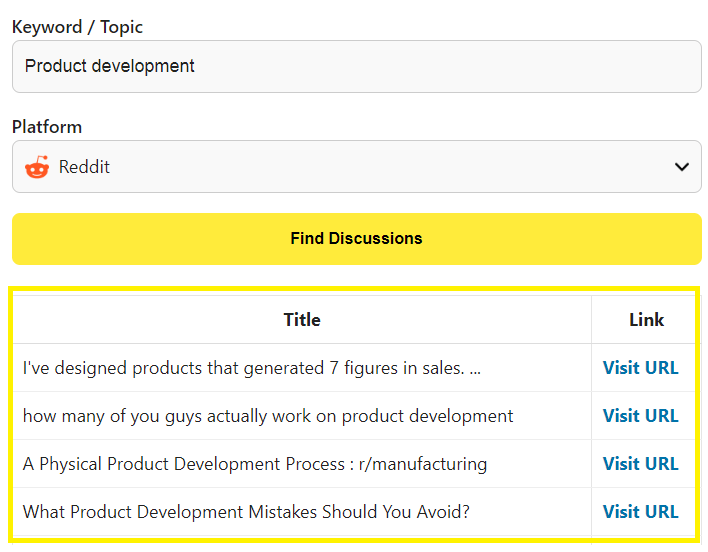
- Multi-Platform Results: Get data from Reddit, Quora, Substack, Hacker News, YouTube, and more, without switching tabs.
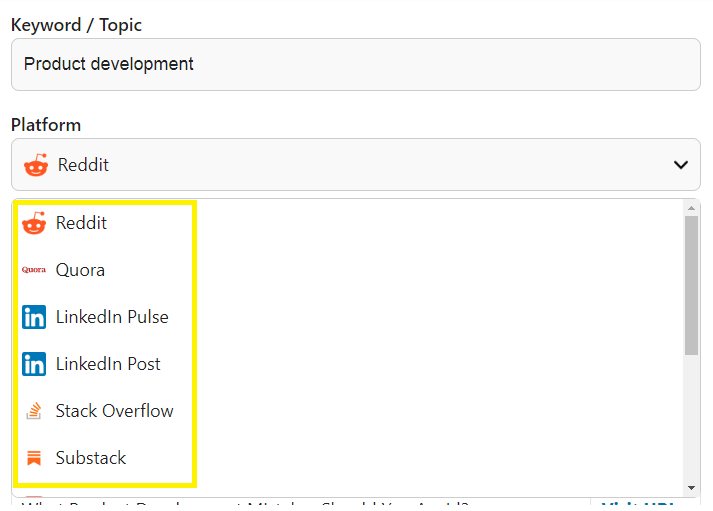
- No Login Needed: Use the tool right away. No signup or email required.
- CSV Export: Download all the questions and links for easy use in your content strategy or client research.
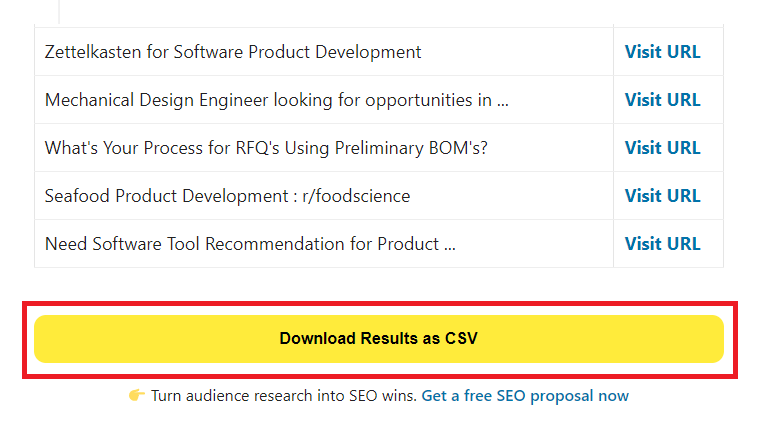
- Google-Indexed Content: Most results are already indexed by Google, so you can find SEO-friendly inspiration fast.
Use case for SEOs and content marketers:
- Find blog topics people actually care about: Skip generic keywords, write about real problems and questions.
- Discover zero-search volume gems: Uncover high-intent topics missed by traditional keyword tools.
- Create human-first content: Use real phrasing and pain points shared by your target audience.
- Get content ideas fast: Save hours of research and never run out of content topics.
- Stay ahead of trends: Spot rising conversations before they go mainstream.
Pricing and plan: The tool is 100% free to use, no account creation or payment required.
Website: https://seogrowthnotes.com/audience-research/
“This tool completely changed how we do content research at Tenet UI/UX. Instead of guessing what people want, we now start with their real questions—and that’s helped us create content that gets shared and ranked.”
— Shantanu Pandey, Founder of Tenet.
8. Google Trends
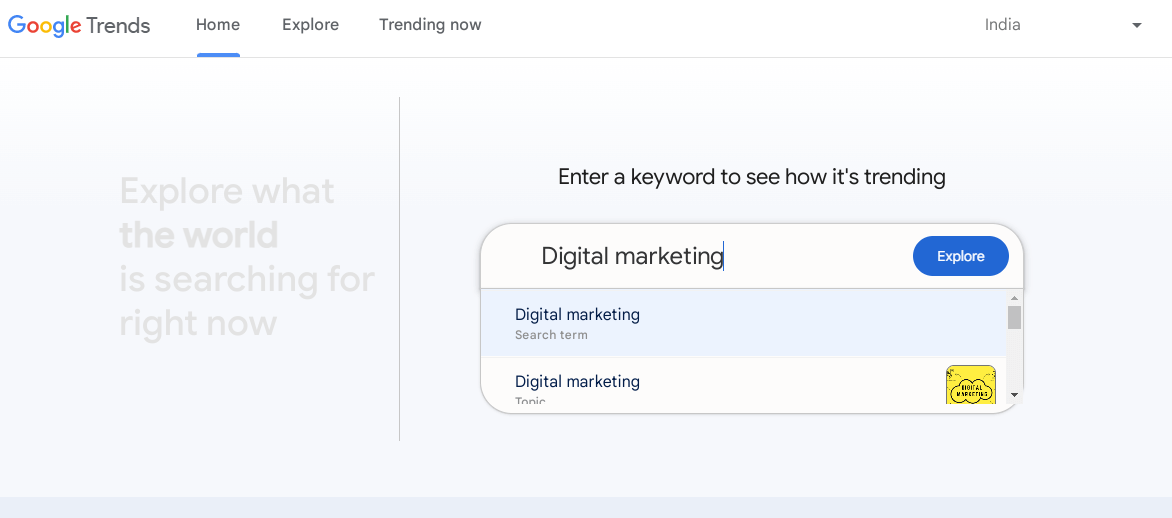
What it does: Google Trends shows what people are searching for right now on Google. It helps content marketers spot trending topics, compare keywords, and plan content based on real search interest over time. You can track what’s hot in your niche and create content that your audience truly cares about.
Key features:
- Real-Time Search Trends: See what’s trending across the web in the last 24 hours. This helps you stay updated and act quickly on hot topics.
- Compare Keywords: Compare up to five search terms to see which one is more popular. This helps in picking better-performing keywords.
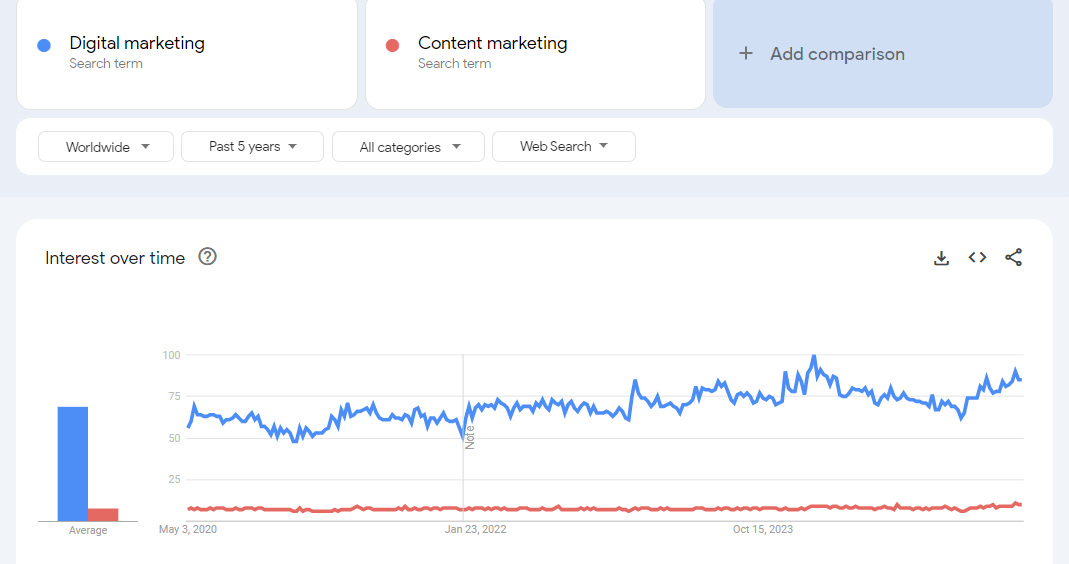
- Interest by Region: Find out where a keyword is trending. This is useful for localizing your content.
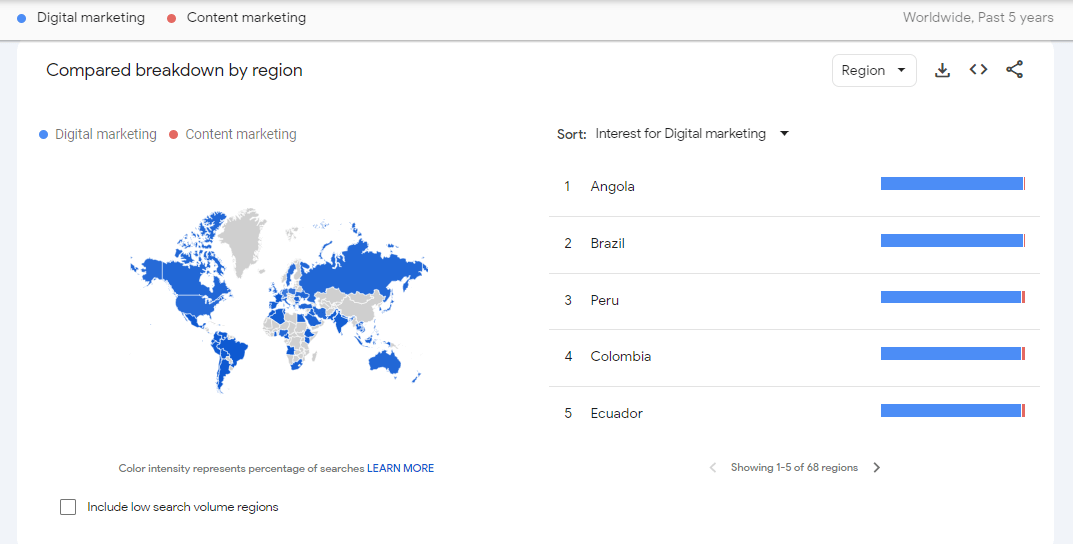
- Related Queries and Topics: Discover what else people are searching for related to your topic. This is great for content expansion and topic clustering.
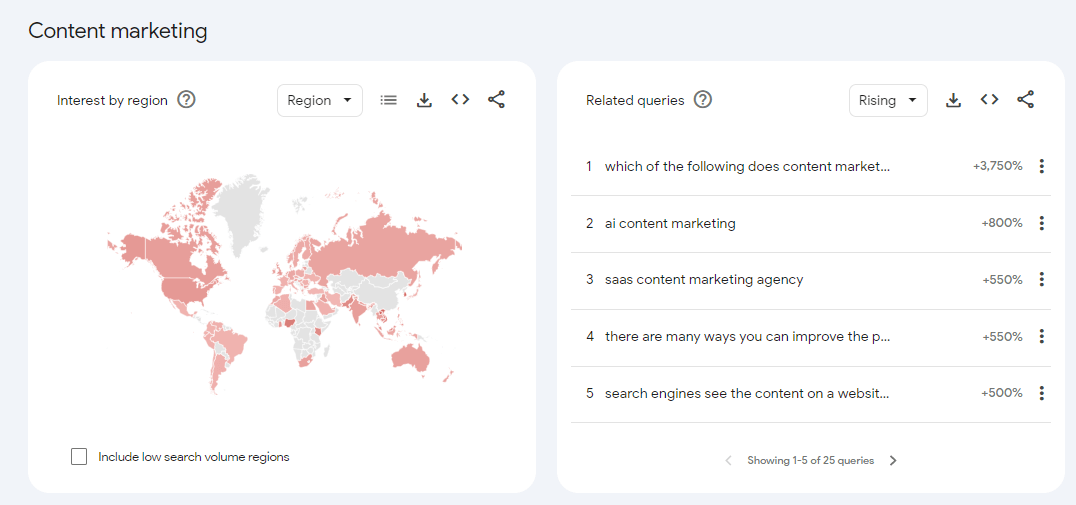
- Historical Data Visualization: Check keyword trends going back to 2004. Helps in planning seasonal or evergreen content.
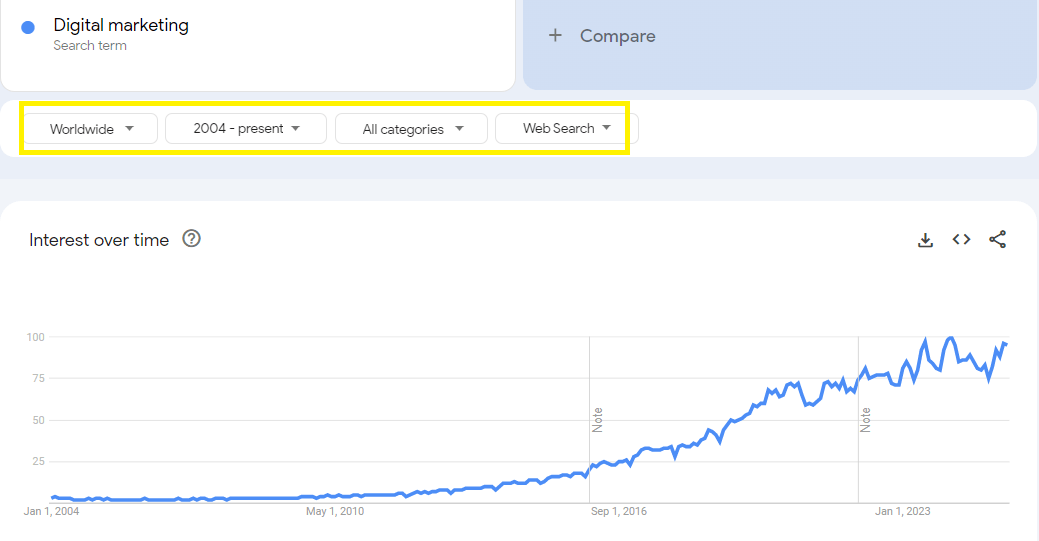
Use case for SEOs and content marketers:
- Spot trending topics – Create timely content based on current search interest.
- Compare keyword popularity – Choose the best keyword with actual search data.
- Find content gaps – Discover rising topics your competitors may have missed.
- Plan local content – Target regions where a topic is trending.
- Optimize content calendar – Align publishing with seasonal or trending interest spikes.
Pricing and plan: Google Trends is 100% free to use with no subscription required.
Website: https://trends.google.com/trends/
9. AnswerThePublic
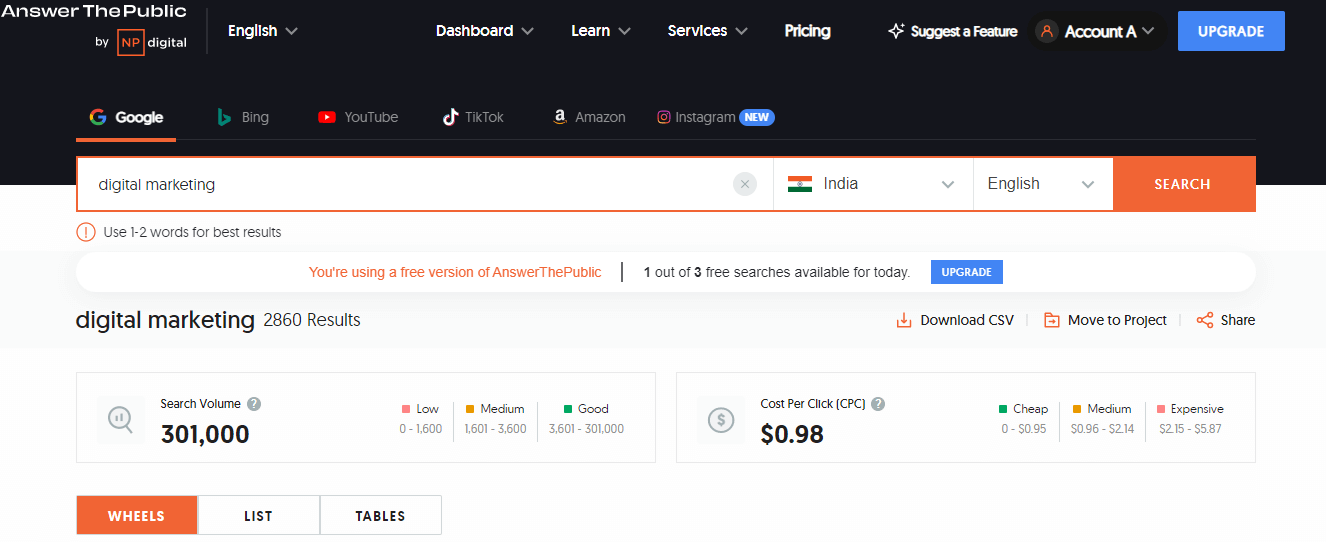
What it does: AnswerThePublic shows you the real questions people are typing into Google. It helps content marketers find what their audience cares about, so they can create blogs, videos, and SEO content that truly connects. With this tool, you stop guessing and start creating what people actually want to read.
Key features:
- Search Listening Visualization: See questions, comparisons, and prepositions in a visual map so you quickly understand search intent.
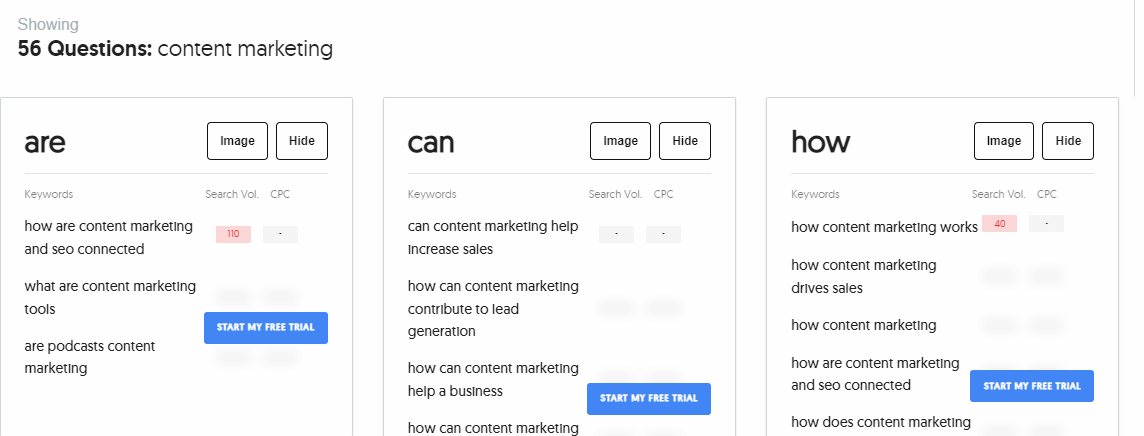
- Search Volume & CPC Data: Know how often a keyword is searched and how much advertisers pay for it.
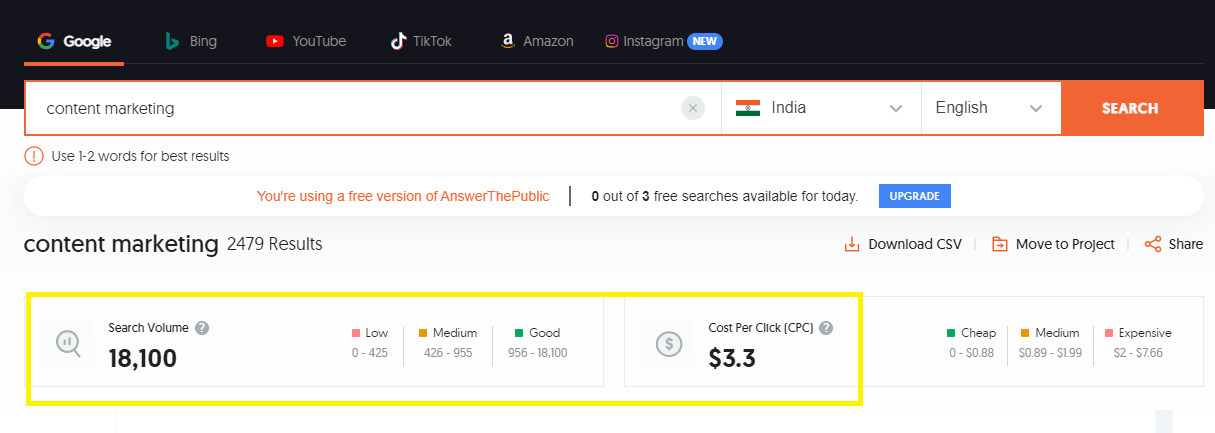
- Search Alerts: Get weekly email updates with new questions being asked around your chosen topic.
- Unlimited Daily Searches (Pro & Expert): Never hit a daily limit, explore as many keywords and topics as you need.
- CSV & Image Downloads: Export your keyword research in spreadsheets or high-res visuals for reports and presentations.
- Organize with Tags & Folders: Keep all your searches grouped by project or client using tags and collections.
Use case for SEOs and content marketers:
- Plan blog content that ranks: Discover what people search so you can create helpful articles.
- Find untapped keywords: Spot hidden content ideas your competitors are missing.
- Track search trends over time: Watch how questions change and adapt your content strategy.
- Create client reports faster: Download visuals and CSVs to include in strategy decks.
- Avoid writer’s block: Always have a list of new content ideas ready.
Pricing and plan: Individual plans start at $5/ month, with Pro ($49/month) and Expert ($99/month) plans available.
Website: https://answerthepublic.com/fa0qvw/for/content-marketing
10. Google Search Console
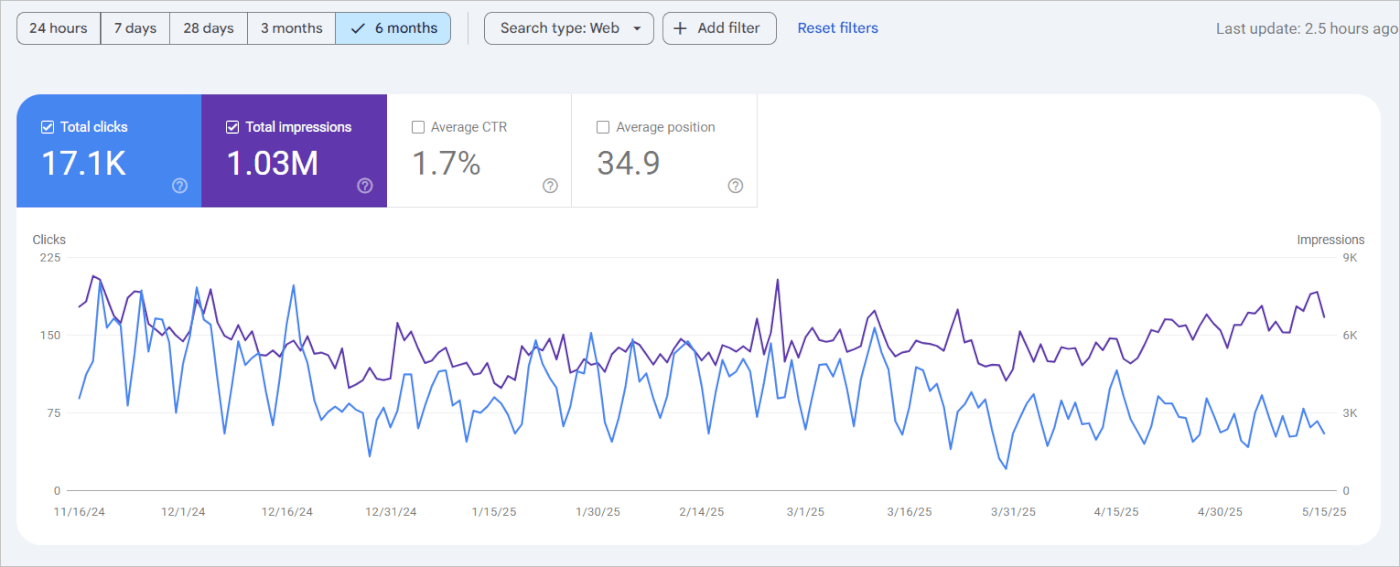
What it does: Google Search Console helps you see how your website performs on Google Search. It shows which pages rank, what keywords bring traffic, and if there are any issues affecting your site’s visibility. Content marketers use it to improve rankings, fix problems, and grow organic traffic.
Key features:
- Performance Reports: See clicks, impressions, average position, and top keywords driving traffic to your site.
- Index Coverage: Know which pages are indexed and which ones have issues, like crawl errors or mobile usability problems.
- URL Inspection Tool: Check how Google sees a specific page and troubleshoot indexing or crawling problems.
- Sitemaps Submission: Submit XML sitemaps so Google can better understand and crawl your website.
- Core Web Vitals & Mobile Usability: Get insights into how fast your pages load and how they perform on mobile devices.
Use case for SEOs and content marketers:
- Find top-performing keywords: Learn what search terms bring people to your site and create content around them.
- Fix visibility issues: Spot and fix indexing problems that prevent your pages from appearing on Google.
- Monitor content performance: Track traffic trends for specific blog posts and landing pages to optimize your strategy.
- Improve user experience: Use Core Web Vitals data to make your site faster and more mobile-friendly.
Pricing and plan: Google Search Console is completely free for all website owners.
Website: https://search.google.com/search-console/about
FAQs
What are the best free content marketing tools for beginners?
The best free content marketing tools for beginners are Semrush (freemium), Ahrefs Webmaster Tools, Canva, ChatGPT Free Plan, Google Trends, Google Search Console, Hunter, AnswerThePublic, Audience Research Tool by SEO Growth Notes, and the SERP Similarity Checker.
Can I do SEO without paying for expensive tools?
Yes, you can do SEO using free tools like Google Search Console, Google Trends, Ahrefs Webmaster Tools, ChatGPT (Free), and SERP Similarity Tool to handle keyword research, site audits, and competitor tracking.
How do freemium tools compare to premium tools?
Freemium tools provide essential SEO features at no cost, while premium tools offer advanced data, automation, and collaboration options for professional and large-scale SEO strategies.
Which free tool helps with keyword research the most?
Semrush’s Keyword Magic Tool (freemium) is the most powerful free keyword research tool, with 20M+ keyword ideas. Ahrefs Keyword Generator and Google Trends are also highly effective.
Is Canva really free for content design?
Yes, Canva is free for content design with thousands of templates and assets. Premium features like Brand Kit and advanced exports are available in Pro plans.
How can I check if two keywords should be in the same article?
Use the free SERP Similarity Tool by SEO Growth Notes to compare keyword overlap and decide if keywords should be combined or kept separate in your content.
What tools can help me find blog topic ideas quickly?
Semrush Topic Research, AnswerThePublic, and Audience Research Tool by SEO Growth Notes help you quickly find blog topics based on trending data and real user questions.
How do I discover what my audience is searching for online?
Use Google Trends, Google Search Console, and the Audience Research Tool by SEO Growth Notes to discover keywords, queries, and active discussions from your audience.
Which content tools are useful for link building and outreach?
Hunter (Free Plan), Ahrefs Webmaster Tools, and Google Search help with link building by finding email contacts, backlink data, and outreach opportunities.
Can I track how well my content performs using free tools?
Yes, track content performance using Google Search Console, GA4, and Semrush (freemium) to monitor traffic, clicks, keyword positions, and engagement metrics.
What tools help avoid keyword cannibalization?
Use the SERP Similarity Tool and Google Search Console to detect overlapping keyword rankings and resolve cannibalization by merging or adjusting pages.
How do I generate SEO titles and meta descriptions automatically?
Use ChatGPT, Semrush SEO Writing Assistant, or Canva’s Magic Write AI to generate SEO-optimized titles and meta descriptions quickly and at scale.
Which free tool is best for analyzing competitors’ content?
Ahrefs Webmaster Tools is the best free tool for analyzing competitor content, showing top pages, backlinks, and keyword gaps.
Are there tools to find trending content in real-time?
Use Google Trends, AnswerThePublic, and SEO Growth Notes’ Audience Research Tool to monitor real-time content trends and discover what’s gaining popularity.
How can I optimize old blog posts using free tools?
Use Google Search Console, Semrush Content Audit Tool (freemium), and ChatGPT to identify underperforming posts and rewrite or update them for better SEO performance.

Sk Rafiqul Islam is a content marketing practitioner with 3+ years of practical experience. He spends most of his time helping businesses to build a loyal audience with content marketing. He is also running a tech career blog called 10Pie and content marketing VIP, a bi-weekly marketing newsletter. In his free time, he loves reading books and playing football.
